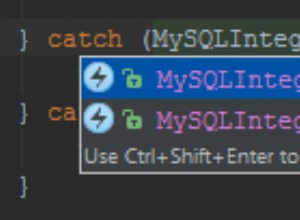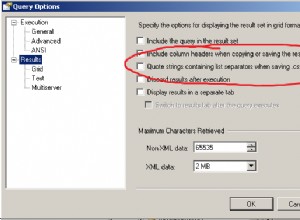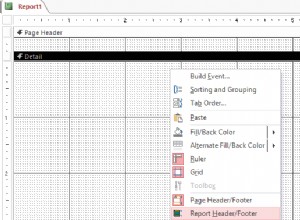Avec la version 11.0.4 (il n'y a pas de version 11.0.4, bien sûr) vous avez au moins deux choix (à part écrire un parseur vous-même) :
Selon la version de RDBMS que vous utilisez, voici quelques options :
Le premier :pour Oracle 11.1.0.7 et plus, installez Apex 5 et utilisez apex_json paquet :
-- here I have 12.1.0.1 version with version 5 of apex installed
column ora_version format a21;
column apex_version format a21;
select (select version from v$instance) as ora_version
, (select version_no from apex_release) as apex_version
from dual;
--drop table test_2;
/* our test table */
create table test_2(
c_a date,
c_b date,
c_c number,
c_d number,
c_e number
);
select * from test_2;
declare
l_json_doc clob;
begin
dbms_output.put_line('Parsing json...');
l_json_doc := '{"a":"01/01/2015","b":"31/12/2015",
"c":"11111111111","d":"1111111111",
"e":"1234567890"}';
apex_json.parse(l_json_doc);
insert into test_2(c_a, c_b, c_c, c_d, c_e)
values(apex_json.get_date(p_path=>'a', p_format=>'dd/mm/yyyy'),
apex_json.get_date(p_path=>'b', p_format=>'dd/mm/yyyy'),
to_number(apex_json.get_varchar2(p_path=>'c')),
to_number(apex_json.get_varchar2(p_path=>'d')),
to_number(apex_json.get_varchar2(p_path=>'e')));
commit;
dbms_output.put_line('Done!');
end;
/
column c_c format 99999999999;
select to_char(c_a, 'dd/mm/yyyy') as c_a
, to_char(c_b, 'dd/mm/yyyy') as c_b
, c_c
, c_d
, c_e
from test_2;
Résultat :
ORA_VERSION APEX_VERSION
--------------------- ---------------------
12.1.0.1.0 5.0.2.00.07
1 row selected.
Table created.
no rows selected.
Parsing json...
Done!
PL/SQL procedure successfully completed.
C_A C_B C_C C_D C_E
---------- ---------- ------------ ---------- ----------
01/01/2015 31/12/2015 11111111111 1111111111 1234567890
1 row selected.
Deuxièmement :utilisez l'open source PL/JSON
. Je ne l'ai jamais utilisé auparavant, alors j'en profite pour l'essayer. C'est assez similaire à apex_json .
declare
l_json json; --json object
l_json_doc clob;
begin
dbms_output.put_line('Parsing json...');
-- parsing is done upon object instantiation
l_json_doc := '{"a":"01/01/2015","b":"31/12/2015",
"c":"11111111111","d":"1111111111",
"e":"1234567890"}';
l_json := json(l_json_doc);
insert into test_2(c_a, c_b, c_c, c_d, c_e)
values(to_date(l_json.get('a').get_string, 'dd-mm-yyyy'),
to_date(l_json.get('b').get_string, 'dd-mm-yyyy'),
to_number(l_json.get('c').get_string),
to_number(l_json.get('d').get_string),
to_number(l_json.get('e').get_string));
commit;
dbms_output.put_line('Done!');
end;
column c_c format 99999999999;
select to_char(c_a, 'dd/mm/yyyy') as c_a
, to_char(c_b, 'dd/mm/yyyy') as c_b
, c_c
, c_d
, c_e
from test_2;
Résultat :
C_A C_B C_C C_D C_E
---------- ---------- ------------ ---------- ----------
01/01/2015 31/12/2015 11111111111 1111111111 1234567890
01/01/2015 31/12/2015 11111111111 1111111111 1234567890
2 rows selected.
Présentation de json_table() dans la version 12.1.0.2 rend l'analyse JSON un peu plus simple (juste pour des raisons de démonstration) :
insert into test_2
select to_date(c_a, 'dd-mm-yyyy')
, to_date(c_b, 'dd-mm-yyyy')
, c_c
, c_d
, c_e
from json_table('{"a":"01/01/2015",
"b":"31/12/2015",
"c":"11111111111",
"d":"1111111111",
"e":"1234567890"}'
, '$'
columns (
c_a varchar2(21) path '$.a',
c_b varchar2(21) path '$.b',
c_c varchar2(21) path '$.c',
c_d varchar2(21) path '$.d',
c_e varchar2(21) path '$.e'
)) ;
résultat :
select *
from test_2;
C_A C_B C_C C_D C_E
----------- ----------- ---------- ---------- ----------
1/1/2015 12/31/2015 1111111111 1111111111 1234567890




